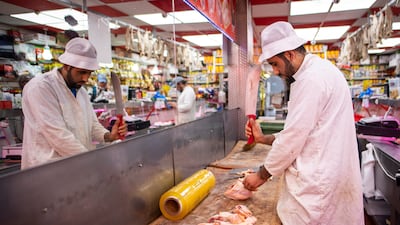Britain is facing a shortage of one million workers, in a growing crisis that would have a damaging economic effect, new figures from the Office for National Statistics have shown.
The twin shocks of the Covid-19 pandemic and Brexit – the UK's departure from the EU – have resulted in labour shortages in key sectors, including meat production, catering, haulage, construction and care services.
Unless Prime Minister Boris Johnson finds a solution within the next 10 days, farmers say they will have to begin mass cull of up to 120,000 pigs because of a lack of abattoir workers.
The British Meat Processors Association estimates that there’s a shortfall of 15,000 butchers. Up to 80 per cent of employees at some meat processing centres came from Eastern Europe but many have not returned post Brexit and pandemic.
A loss of EU workers – whose free movement into Britain was ended by Brexit – has meant turkey production for Christmas has been slashed by 20 per cent.
The National Farmers' Union found that numbers of EU seasonal fruit and vegetable pickers were down by 11 per cent this year, with one farm having to let 600 tonnes of produce rot in fields.
The petrol crisis is now expected to continue potentially until December, despite 100 Army drivers being deployed this week. There is an estimated shortage of 100,000 heavy good vehicle drivers.

Declining working conditions, poor wages and long hours have seen the number of lorry drivers drop by more than 50,000 since 2016 – including 12,000 EU nationals, according to ONS figures.
With high demand for lorry drivers on Germany, France and Italy, the upmarket British supermarket Waitrose is now offering £53,780 ($72,800) a year for the job.
Supermarket staff shortages are also having a knock-on effect. While its petrol station pumps were full at a Sainsbury’s branch in Sussex, south-east England, yesterday, it was unable to open as there were not enough staff to manage queues.
Job vacancies are occurring elsewhere. The construction industry – key to economic growth – is 140,000 workers short, or 10 per cent of the total, according to The Times.
Care home workers now have to be double vaccinated but 30,000 have declined, meaning that by mid-November the workforce will lose 7 per cent of employees.
With staff numbers down by a fifth, the St Austell Brewery in Cornwall, south-west England, estimates it lost £2 million over the summer through reduced capacity.
Hotels, which relied on EU workers for 40 per cent of staff, have one in six jobs vacant, with some having to cap guest numbers.
With the furlough scheme – which supported jobs during the pandemic – ending for one million people last week, it is expected more workers will be available. But up to 500,000 over-50s have retired, and others who were furloughed have decided to take other jobs with a better work-life balance.
“There’s been a re-evaluation of life in lockdown, and a lot of people have said: ‘I quite like being at home and I might stay there’,” said restaurant chain owner Jeremy Roberts.


